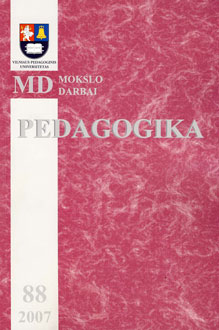Socialinių pedagoginių problemų bendrojo lavinimo mokykloje analizė: mokinių ir klasių auklėtojų požiūris
Analysis of Social-Pedagogic Problems in Comprehensive School: Viewpoint of Pupils and Class Tutors
Author(s): Odeta MerfeldaitėSubject(s): Education
Published by: Vytauto Didžiojo Universitetas
Keywords: social-pedagogic problems; social-pedagogic
Summary/Abstract: Social, political and economic conditions determine welfare of society. The opening opportunities require new changes in the education system playing a key role in establishing open civil society, strengthening its cultural and economic powers, reducing social exclusion, restoring social justice and solidarity (provisions of the national education strategy for 2003-2012; official gazette, 2003, no 71-3216). Alongside the increasing importance of education the basic education becomes one of the most important priorities of the national education policy. It has to be modern, efficient and directed towards educating an independent and responsible individual, active civil community and knowledge society, and providing opportunities for everybody to acquire basic capacities, knowledge as well as social and practical skills. One of the key criteria of success, predetermining efficient implementation of school goals, is provision of complex social- pedagogic assistance to pupils. However, the system of social assistance is efficient only in the open communication based school, responding not only to life changes and challenges of reality but also to the changing needs of society and specific community. Therefore, one of the key objectives of school faciliating anticipation of future school perspectives is identification of the most acute social- pedagogic problems in school community and consideration of these problems. The article deals with the topical social-pedagogic problems faced by pupils in comprehensive schools, and dependence of these problems on pupils' progressiveness, age, gender, place of residence and situation in the family. The article also identifies responsibilities of pupils and class tutors in considering specific problems. With a view to realizing the above goals the following objectives have been identified: 1) to specify the approach of pupils and class tutors towards social pedagogical problems at school; 2) to analyse dependence of social-pedagogic problems on pupils' age, gender, place of residence and situation in the family; 3) to define the sate of cooperation between a school and parents. In pursuance of the anticipated objectives, the inquiry of teachers and pupils of comprehensive schools has been carried out. The inquiry covered class tutors and pupils from grades 7 to 10 of all schools. The sample of class tutors comprised class tutors of grades v—xii of 66 comprehensive schools (48 city and 18 rural comprehensive schools); women comprised the majority (n = 62), and there were only 4 men. The major part (n = 55) of the inquired have been working at school for more than five years; 9 respondents have from 2 to 4 years experience of work at school and job record of 2 respondents is less than two years. The sample of pupils amounted to 900 pupils from grades vii-x (59 % city and 41 % rural comprehensive school pupils). In terms of gender, boys comprised 53 % of respondents and girls 47 %. ..
Journal: Pedagogika
- Issue Year: 2007
- Issue No: 88
- Page Range: 43-49
- Page Count: 7
- Language: Lithuanian

